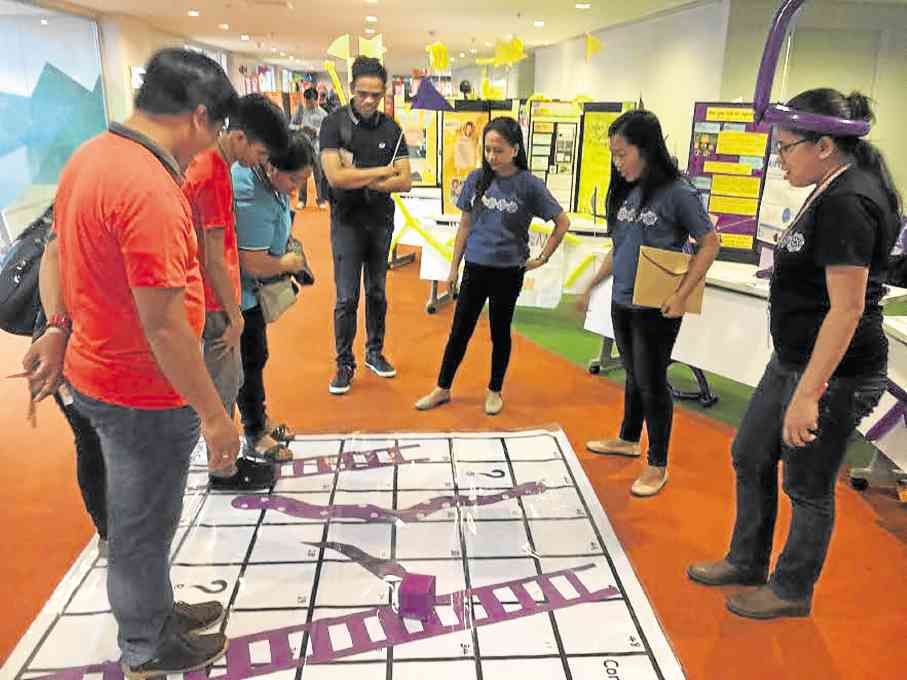Globe builds army of teachers to destroy fake news

Teachers demonstrate how their life-size snakes and ladders game works at a Prism expo. —LEO SABANGAN
In a world infiltrated by fake news and “alternative facts,” telecommunications company Globe has taken it upon itself to arm the country’s educators with the digital know-how to be able to teach their students how to be more discerning of the information they receive.
Globe does this through one of its corporate social responsibility programs called Prism, which involves training around 1,000 schoolteachers nationwide on digital literacy.
The program, which has had two runs in Metro Manila and Naga City in the past three months, is primarily geared toward educators from private schools teaching the media and information literacy subject, says Michelle Tapia, Globe education strategy and innovation advisor for corporate strategy and business development.
“There’s a universe of information on the internet, and students and teachers should know how to maneuver through this and identify which ones are facts, and which are alternative facts,” she says. “Not everyone does that. Some people just digest everything they read and accept them [as truth]. So that’s part of digital literacy: Knowing when to accept information as fact, and when to investigate further.”
Globe is also taking the program to Cebu, Pampanga and Cagayan de Oro. Before they begin, teachers are assessed individually so facilitators can gauge their digital literacy level. Then it’s on to Prism’s first phase: A two-day boot camp covering a series of activities focused on teaching the participants how to maximize digital tools.
“We also teach them about design thinking, how to empathize with their ‘customers,’ which are their administrators and students. How do you find out how they feel, what are their challenges?” says Tapia. “We [also] teach them innovation, how to be creative.”
She cites as an example a meme that went viral: A made-up Facebook comment thread containing a discussion among People Power personalities such as former President Corazon Aquino and Cardinal Jaime Sin.
“That’s one way of teaching kids about People Power because they can relate to it,” she says.
At the end of the boot camp, participants are divided into seven groups to work on “missions,” or projects which they need to complete in three weeks. They work on these via a web-based learning platform called Brightspace, where they can also access past lectures, articles and other materials they want to review.
“There’s a lot of personal coaching done by one or two coaches whom we assign per mission,” says Tapia. “Since teachers are busy during the day, they would call their coaches at night to ask how to build a blog, etcetera, and we’re happy that they do that. We know teachers are hardworking, and they just need a coach to guide them through all the technology transitions.”
After three weeks, teachers get to showcase their missions through an expo, which doubles as their graduation from Prism.
“Some created games online using templates; others who are more advanced created games which need a bit of programming. It’s up to them,” Tapia says. “Others created a video about social ‘netiquette.’ Others created a physical, life-size snakes and ladders game laid out on the floor, which also required some online interaction.”
Tapia says they selected their partner schools for Prism through the network of the Private Education Assistance Committee (Peac), the trustee of the Fund for Assistance to Private Education (Fape). Schools who have no teachers under the media and information literacy subject can nominate participants who teach other senior or junior high school subjects.
Prism also came about since Globe saw the need to assist private schoolteachers who do not have the financial means to take up formal courses on digital literacy to keep up with today’s fast-paced technological changes, Tapia adds.
“Ultimately, what we want is for them to be comfortable using technology. It changes so quickly—there are so many apps, games—and we want them to be able to decide for themselves that this is how I want to teach my students,” she says.














